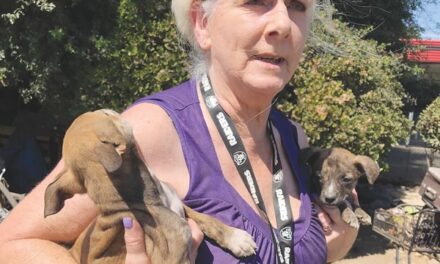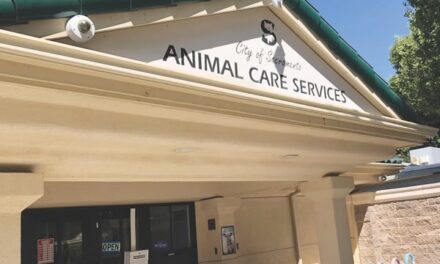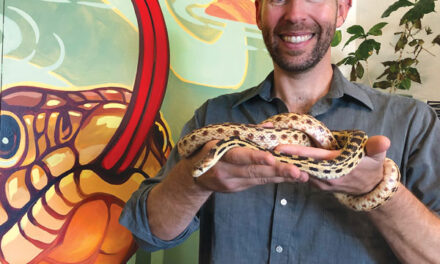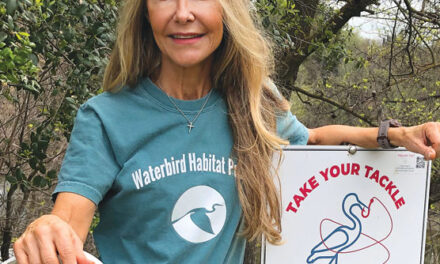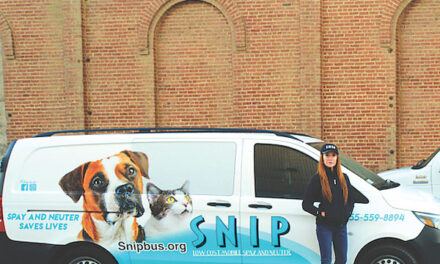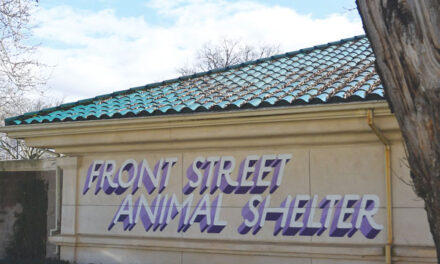The 4-month-old kitten was neutered, vaccinated, microchipped and ready to take on the world—including the festive new “cat tree” with the shiny round “toys” dangling within paws’ reach. One exuberant leap into the decorated fir branches and the whole Christmas tree came crashing down.
Though the holidays look a little different this year as people scale down the family get-togethers and forgo neighborhood parties, it doesn’t mean we won’t be adorning a tree, hanging a wreath or indulging in spiked eggnog. Including our companion animals in the festivities is part of the fun—just remember to do it safely with these tips by the American SPCA:
DECORATION DANGERS
Secure the Christmas tree. Pets are curious about this exciting new addition to the home. Cats and kittens will bat at ornaments and climb branches. Puppies will gnaw on trunks. It’s important to properly anchor the tree so it doesn’t tip over.
Keep a cover on the tree’s water container—stagnant tree water may contain fertilizer, preservatives or bacteria, which can cause nausea or diarrhea if pets imbibe. Clean up needles as they fall.
Hang lights, ornaments and garlands, including strings of popcorn, out of reach. Shards of glass from broken decorations, if swallowed, can cause intestinal hemorrhaging and blockage.
Toss out the tinsel. Cats and kittens love sparkly, light-catching tinsel they can chew and swallow, which can lead to an obstructed digestive tract (and possible surgery), severe vomiting and dehydration. Keep wrapping paper, ribbons and bows away from pets.
Ensure holly, mistletoe and lilies are inaccessible. When ingested, holly can cause nausea, vomiting and diarrhea in pets. Mistletoe can cause gastrointestinal upset and cardiovascular problems. Many varieties of lilies can result in kidney failure in felines.
Embrace battery-powered candles. Pets can burn themselves on lighted candles or knock them over, causing a fire. Hide wires and batteries. A wire can deliver a potentially lethal shock. A punctured battery can cause burns to the mouth and esophagus.
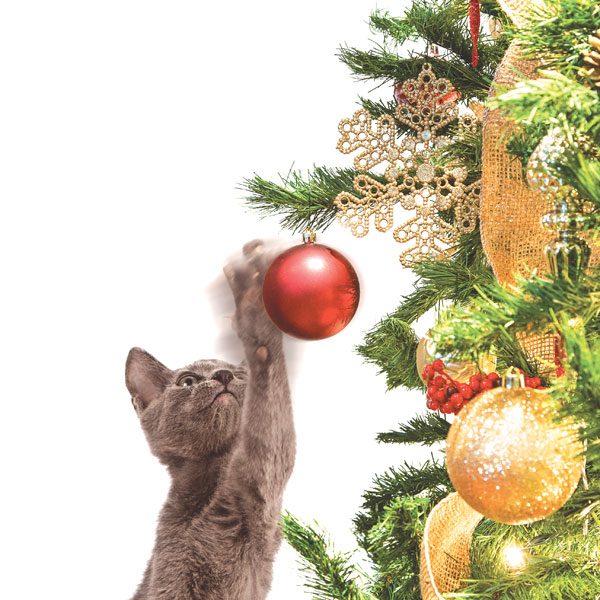
FOOD PERILS
Don’t leave appetizers, dinner or desserts unattended on countertops and tables. Turkey bones can splinter and puncture a dog’s digestive tract. Meat fat trimmings with heavy seasoning and salt can upset stomachs.
Chocolate can cause vomiting and diarrhea, panting, excessive thirst and urination, hyperactivity, abnormal heart rhythm, tremors, seizures and death. Dark chocolate, especially baking chocolate, is more dangerous than milk chocolate.
Xylitol, a sweetener used in products such as gum, candy and baked goods, can lead to liver failure in pets. Initial signs of toxicosis include vomiting, lethargy, loss of coordination and seizures. Baked goods, such a holiday fruitcakes, often contain raisins and currants, which can result in kidney failure in dogs.
Be careful with cocktails. Alcoholic beverages can cause vomiting, diarrhea, decreased coordination, central nervous system depression, difficulty breathing, tremors, abnormal blood acidity, coma and death.
Stuff stockings with pet-friendly treats. Choose indestructible chew toys or treats designed for safe digestion. Avoid cat toys with loose little parts that can get stuck inside intestines. Instead, gift a new ball that is too big to swallow or a stuffed catnip toy.
PLAY IT SAFE
If you are entertaining this season, give your pet a quiet space to retreat from the festivities, with fresh water and a place to snuggle.
Keep your veterinarian’s phone number at hand, as well as the number and location of your nearest 24-hour emergency vet. If you suspect your pet has eaten anything toxic or poisonous, immediately contact your veterinarian or the ASPCA Animal Poison Control Center at (888) 426-4435.
As we wrap up one of the most challenging years in recent history, this holiday season offers new and significant meaning to watching over our neighbors, embracing community spirit and valuing one another, including our four-legged friends. Let’s keep them safe, too.
Cathryn Rakich can be reached at crakich@surewest.net. Follow us on Facebook, Twitter and Instagram: @insidesacramento.




